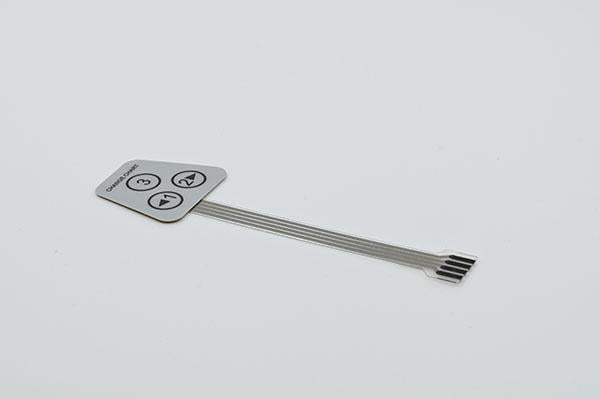Innovations in Membrane Switches for Touch-Sensitive Devices
Innovations in Membrane Switches for Touch-Sensitive Devices
Blog Article
Recognizing the Value of Membrane Switches in Interface
Membrane buttons are integral components in the style of efficient customer interfaces, facilitating not only performance however additionally enhancing visual charm and customer communication. As we explore the numerous advantages and future trends associated with Membrane technology, it becomes clear that these switches are much more than just elements; they represent a convergence of innovation and usefulness.
What Are Membrane Switches?

The spacer layer, which has glue residential properties, enables the splitting up of the circuit layer from the overlay, making certain that the button stays in a non-activated state until pressed. When stress is used to the overlay, it compresses the spacer layer, linking the void and completing the circuit in the underlying layer. This design not just minimizes the physical space needed for typical mechanical buttons however also boosts the toughness of the device, as Membrane switches are generally immune to dust, moisture, and various other environmental variables.
Frequently found in applications varying from consumer electronic devices to medical tools, Membrane buttons are integral to modern-day technology, providing a effective and user-friendly user interface that aligns with modern design needs.
Advantages of Membrane Buttons
While numerous button technologies exist, Membrane Switches deal unique benefits that make them particularly desirable in numerous applications. One of the main advantages of Membrane switches is their portable design, which enables for space-saving executions in devices where property is restricted. Their thin account not just enhances aesthetic allure but likewise assists in lightweight building.
An additional significant benefit is their resistance to ecological factors. Membrane switches are normally secured against moisture, dust, and impurities, making them ideal for use sought after settings, such as clinical tools and industrial equipment. This toughness expands the life-span of the switch, reducing upkeep expenses and enhancing reliability.
Furthermore, Membrane switches can be personalized to satisfy certain layout needs, incorporating unique graphics and shades that enhance user interaction. Their tactile feedback alternatives can also be customized to give a satisfying individual experience. Furthermore, Membrane switches are affordable, especially in high-volume applications, as they can be created effectively.
Applications in Numerous Industries

In the customer electronic devices market, Membrane buttons prevail in devices such as microwaves, cleaning devices, and remote controls. Their responsive feedback and visual options boost individual experience while providing a streamlined, contemporary appearance. Furthermore, automotive makers utilize Membrane buttons in dashboard controls and infomercial systems, where area is restricted, and user involvement is crucial.
Furthermore, the commercial field leverages Membrane buttons in control panels for machinery and devices, allowing for user-friendly procedure in typically rough atmospheres. Their resistance to chemicals and moisture guarantees long life and reliability in these applications. Generally, the adaptability of Membrane Switches adds significantly to their extensive usage, making them essential in different technical domains.
Design Factors To Consider for Membrane Buttons

When creating Membrane buttons, numerous vital considerations should be thought about to guarantee optimum functionality and user experience. The selection of products is important; picking long lasting, high-grade substratums can improve the button's durability and resistance to environmental factors such as moisture and temperature level variations.
Second of all, the style of the graphic overlay must focus on clearness and ease of use. Symbols and message should be clear, and the design should help with intuitive interaction (membrane switches). In addition, responsive comments is important; incorporating a responsive dome or other mechanisms can improve the customer experience by supplying physical confirmation of activation
Another vital aspect is the switch's electric performance. Designers have to make sure that the conductive traces are correctly designed to lessen resistance and stay clear of signal interference. This involves analyzing the needed actuation force and making certain compatibility with the electronic parts they will user interface with.

Future Fads in Membrane Modern Technology
As innovation proceeds to development, Membrane switches are positioned to evolve substantially, driven by innovations in materials and making techniques. One emerging fad is the incorporation of sophisticated products, such as conductive inks and versatile substratums, which improve longevity and decrease the general weight of Membrane buttons. These materials not only boost the responsive response however additionally allow for the design of switches that can withstand harsher ecological problems.
Furthermore, the integration of touch-sensitive modern technologies is changing traditional Membrane Switches right into even more interactive interface. Capacitive touch sensors embedded within Membrane switch panels can supply an extra receptive and intuitive individual experience, lining up with the expanding need for smooth, modern-day layouts in informative post customer electronic devices.
In addition, advancements in printing techniques, such as digital and 3D printing, enable rapid prototyping and customization of Membrane switches. This flexibility allows manufacturers to respond quicker to market demands and consumer preferences.
Lastly, sustainability is becoming a substantial emphasis, with suppliers discovering green products and procedures. As these patterns unfold, the future of Membrane modern technology assures boosted capability, visual charm, and environmental responsibility, strengthening their duty in sophisticated individual interfaces across numerous sectors.
Final Thought
Finally, Membrane Switches represent an essential component in the layout of interface, integrating functionality with visual versatility. Their advantages, consisting of longevity and resistance to ecological elements, make them suitable for varied applications across numerous markets. Additionally, thoughtful style considerations boost individual communication and experience. As improvements in technology proceed, the evolution of Membrane switches is anticipated to further improve interface, driving innovation and boosting usability in a significantly complicated technical landscape.
Membrane buttons are integral elements in the layout of reliable user interfaces, assisting in not just functionality however likewise boosting visual appeal and individual communication.Membrane Switches offer as a crucial part in numerous user interfaces, assisting in a smooth communication in between users and electronic devices.While many button modern technologies exist, Membrane Switches deal distinctive advantages that make them specifically preferable in various applications.Moreover, Membrane switches can be customized to satisfy certain style demands, integrating one-of-a-kind graphics and shades that boost customer communication.In verdict, Membrane Switches stand for a crucial part in the style of individual interfaces, integrating performance you could check here with aesthetic flexibility.
Report this page